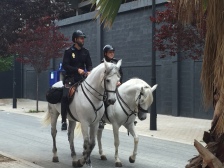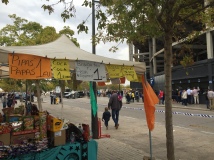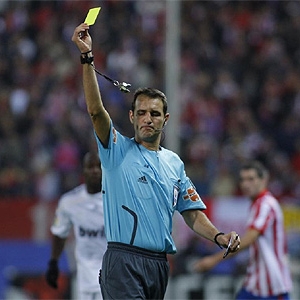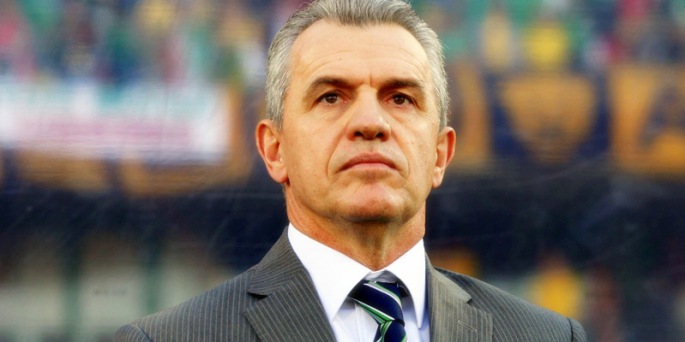
As I watch Levante crash to a 4-0 defeat at home to Real Sociedad, a performance described by the Revista podcast as the worst by any team in La Liga so far this season, a kid sits in front of my wearing a coat bearing the slogan “Never EVER give up.” He left before the end.
To be fair, an awful lot of the faithful did, and those that didn’t only hung around to show their side the contents of their pockets as they left the pitch.

The progressive reaction to the four goals followed the classic stages of football depression:
Goal 1: Shock.
Goal 2: Anger.
Goal 3: Early departure.
Goal 4: Ironic applause of the opponents.
And soon afterwards coach Lucas Alcaraz had paid with his job. You could never criticise him for a lack of effort as his touchline gurning and gesticulating makes Jurgen Klopp look like Niles Crane. A cruel critic might have asked whether there was anything behind his exhortations for hard work. If his preparation for this match had amounted to something more than hanging that kid’s jacket on the changing room wall and chanting “Never EVER give up.” at his team until their ears bled it didn’t show against La Real.
So does this mark the end of Levante’s gritty fairy tale? Sid Lowe wrote evocatively of the side’s glorious flirtation with the top of the table four years ago, dubbing their collection of gnarled journeymen “The Expendables” as they battled their way to the top of the table. They held on well enough to finish sixth and enjoy an unlikely European adventure the following season. And now it looks like they have come full circle.
In the week after Lowe’s article Levante actually took outright top spot in the league, ironically beating Real Sociedad 3-2. Just one day off the anniversary, La Real delivered the coup which cost Alcaraz his job and leaves the Granotes looking green around the gills. (I know frogs don’t have gills, but it’s so close to a good metaphor I had to follow it through).
By the end of the weekend, there was an even more poignant illustration of Levante’s decline. In a separate piece Lowe wrote of Raimon the groundsman, who arranges the SPanish teams’ flags in order of their league position on the flagpoles that run down the side of the pitch. It was a happy task four years ago; it will have been rather different this week as Raimon shifted Levante’s pennant to the last position on the right side of the stand.

So what has gone wrong? To put things in context, over-achieving is always a fragile business. Surviving in a league where the TV money doesn’t trickle down on crowds of between ten and fourteen thousand isn’t easy. Once you fail to get the fundamentals right, deterioration can set in fast, and three key factors have gone against Levante this year.

Firstly, their success has been on the back of some excellent coaching. The trouble is, when you show your quality at Levante the natural next step is to move on. Luis Garcia established the side in the top division in impressive style, and his predecessor, the much loved Juan Ignacio Martínez, took his work a step further. After a couple of sure-footed managerial appointments, the club’s luck was always likely to run out though – show me a club that have made three consecutive good choices of coach – and Levante haven’t bucked the trend. If Rubi, the new man, is a gem, then they might have a chance, but my money’s on him not being in the hot seat by the end of the campaign. Rubi’s credentials – a spell on the staff at Barsa and an isolated, albeit impressive, successful campaign at Girona in fifteen years of coaching, leave him feeling like a punt more than a sure thing. But then Levante were never in a position to draft in a sure thing, were they?

Secondly, any good players Levante might uncover are always going to snapped up by someone with more cash. From Felipe Caicedo through Arouna Koné to Kaylor Navas, players have moved on to bigger and better things. It’s hard to constantly dig up diamonds in the rough, so there’s bound to be an inevitable creep downwards in quality. If you want a graphic illustration of this point: consider this. Navas, on current form for Real Madrid, might just be the best keeper in the world. They’ve replaced him with Rubén, whose most memorable contribution to a Levante match was this, when he was a Málaga player. Clearly he stuck in the Levante scouts’ minds!
So who have Levante lined up as their latest find, to groom and sell on? Deyverson is an interesting striker, but there’s work to be done if he’s to make a step up from here: a blunt performance against Real was prematurely ended by a red card for diving, which summed up his and his team’s day.

And then what do you have? Nabil Ghilas is fun to watch if you’re a neutral and enjoy seeing a chunky lad put himself about a bit, show flashes of quality, and threaten to do something decisive without ever quite managing it. He’s probably not so much fun to watch if you’re relying on him to pull something out of the fire for your team, and he’s not even Levante’s if they wanted to turn a profit on him.
And then there’s Roger, who runs about a lot.
Ghilas is fun to watch if you’re a neutral and enjoy seeing a chunky lad put himself about a bit
The third issue is hard to define, never mind to address. The quality of players haemorrhaging out is one thing; their character is quite another. Losing leaders like Sergio Ballesteros is not an issue which is easy to address. Juanfran remains, but his half time substitution against Real Sociedad illustrated the danger of relying on a 39-year old to hold your defence together and provide character. Juanfran has been a fine player and a great servant to the Expendables, but there comes a time when even their value expires.
The cruel thing about it all is that while the dismissal of Alcaraz was inevitable, the Real defeat really did illustrate one of the classic patterns of football, played out throughout the ages. There were signs of promise in the last couple of weeks. Okay, they’d lost five of the last seven, which is relegation form in anyone’s book. But some of those performances offered up hope. Obviously there was the derby win over Villarreal, a terrific victory against a side tilting at top spot and in fine form.
Admittedly the Yellow Submarine had a player dismissed in the first half but still, the way a usually progressive side retreated so completely into their shell said something about how Levante imposed themselves on the game. Anyone who saw José Luis Morales and Toño ripping down the flanks and delivering a stream of crosses into the box would have thought this was a side with something about it.
The following week Levante arrived at El Bernabéu and showed plenty of cojones in a 3-0 defeat which saw them stretch their former keeper Navas when the result had yet to be cemented. They’d also shown heart to fight back from two down to claim a draw against Eibar, La Liga’s feistiest side.
But that’s how football goes, isn’t it? Teams start to show promise, often exhibiting fight in defeat against superior opponents, and you hope that level of performance will be sustained and lead to an improvement in results. But once they come up against beatable opposition, all that promise melts away and the cold facts of six points from nine games is all that’s left. The street smarts of Garcia, the quality of Navas, the heart of Ballesteos were all gone. So what’s left for Levante?





































































![1175351055_0[1]](https://peripheralvisiondotme.files.wordpress.com/2013/01/1175351055_01.jpg?w=685)
![Valeron[1]](https://peripheralvisiondotme.files.wordpress.com/2013/01/valeron1.jpg?w=685)














